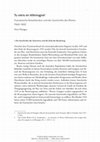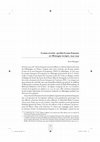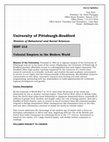Book Chapters by Drew Flanagan

Sylvia Dummer Scheel, Charlotte Faucher, and Camila Gatica Mizala eds. Soft Power Beyond the Nation (Georgetown University Press), 2024
In the early post-World War II period, many French soldiers and civilians with experience in the ... more In the early post-World War II period, many French soldiers and civilians with experience in the French colonial empire came to Germany to participate in the French occupation. This chapter addresses the career of one such figure, French orientalist, folklorist, and propagandist Robert Boutet. As a newspaper editor, ethnologist, and award-winning author in the Protectorate of Morocco in the 1930s, he used his research on Arab and Berber folklore to develop subtle propaganda aimed at the Moroccan youth. Boutet's work, notably 1942's Le Voleur de lumière, avoided overt political messages, instead seeking to co-opt the more "civilized" aspects of Moroccan culture in ways that served the goals of France's colonial civilizing mission there. Through his wonder tales, Boutet undertook a campaign of public diplomacy intended to encourage openness to progress, rational monotheism, and anti-paganism - to make Moroccans want what France wanted. In 1945, Boutet traveled to the French Zone of occupied Germany to serve as one of the editors of the Revue d'information des troupes françaises en Allemagne, the official magazine of the army of occupation. He brought his civilizing methods with him, and began to adapt them to a new mission - "re-civilizing Germans" after 12 years of National Socialist rule.
This chapter explores the transfer of soft power methods and experience from the colonial context to that of postwar Europe. Robert Boutet's story crosses assumed boundaries between European history and "colonial" history, and encourages us to consider the importance of colonial ideas and experience to the construction of European identity after World War II.

Angela Schwarz and Daniela Fleiß eds., Reisen in die Vergangenheit: Geschichtstourismus im 19. und 20. Jahrhundert (Cologne and Vienna, Böhlau Verlag), 2019
This chapter addresses the French vision of German history and how that vision was mobilized and ... more This chapter addresses the French vision of German history and how that vision was mobilized and reshaped during the period of the Allied occupation of Germany, between 1945 and 1955. Considering that transformation through the lens of what Valentin Groebner calls "touristic uses of history," I argue that over the course of the occupation, French official uses of history in their occupied zone gradually were made more "touristic" in order to produce a usable past and smooth the way toward Franco-German "rapprochement."
Focusing on propaganda and instructions intended for ordinary French soldiers and civilians serving in the French Zone, I show that French occupation authorities made use of the German past to frame the problems with German society and culture and inculcate a shared sense of mission in those who participated in the occupation. I then show how the French official vision of Germany was transformed over the course of a decade of occupation to serve new political aims: from a French policy of dividing up Germany politically and culturally, the better to prevent a reunified Germany from threatening France's security, to a policy of seeking "rapprochement" and improved relations with the Germans. I show that the version of German history that the occupiers were instructed to act upon changed in the following three ways:
1. the focus of attention was gradually shifted from the difficult recent Franco-German past to a picturesque presentation of a timeless rural Germany
2. the official version of the German past gradually moved away from recent history, toward concentrating on the more distant early modern, medieval or even ancient past.
3. the official version of German history presented to French occupiers blurred the boundaries between history and motifs from folklore, literature and art
I argue that this touristification of history - the transformation of German history into something picturesque, intended for touristic consumption - dovetailed with postwar German efforts to idealize the past and avoid or downplay difficult questions about the crimes of National Socialism.

Emmanuel Debruyne and James Connolly eds. En territoire ennemi: Les occupations de la Grande Guerre et leurs héritières, 1914-1949 (Paris, Presses universitaires du Septentrion), 2018
After the defeat of the Axis powers in 1945, France became one of four occupying powers in a defe... more After the defeat of the Axis powers in 1945, France became one of four occupying powers in a defeated Germany. The French Zone of Occupation was located in the Franco-German borderlands of the Upper and Middle Rhine, and included portions of the contemporary German states of Rhineland-Palatinate, Baden-Wurttemberg and the Saar. Beginning in spring of 1945 with the French First Army’s crossing of the Rhine, the French forces stationed in occupied Germany were led by officers with long careers in France’s colonial empire, above all in North Africa. In addition, a large proportion of the troops of occupation were recruited from the indigenous and settler populations in French North Africa. In no small way, the French army that occupied Germany during the decade after the Second World War had learned its mission and its trade in colonial service, and its approach to occupation reflected that schooling in a variety of ways.
This paper begins by addressing two figures whose ideas about "pacification" of conquered peoples shaped the conduct of the French occupation - the first French commander in chief in the zone, General Jean de Lattre de Tassigny, and the first commander of the Troops of Occupation, General Joseph de Goislard de Monsabert. It considers how each man applied the lessons of their colonial military experience to the problem of "pacifying" the German population.
The second portion of my paper addresses the notions of prestige and force as they were applied in the conduct of the French army, gendarmerie and military government during the occupation in Germany. Building off of their understanding of Hubert Lyautey’s notion of “pacification,” the French occupiers developed a specific notion of how an occupying army ought to exercise control – through a combination of psychological domination (prestige) and physical domination (force). Both civilian and military officials in the French zone developed strategies that they believed would best allow them to project the prestige of the occupation and of the France, prestige they saw as the key to the success of their political mission. Their actions in the name of prestige reveal both the particular anxieties and priorities of the French occupiers and the colonial roots of their thought on the problem of military occupation.
Syllabi by Drew Flanagan

This course explores the modern history of France since the outbreak of its first democratic revo... more This course explores the modern history of France since the outbreak of its first democratic revolution in 1789, focusing on major issues in the development of French politics, culture, and society. It is taught from a transnational perspective, focusing on connections between events and processes occurring in France and the wider world. Themes addressed in this course include the development and contestation of French national identity, the rise and fall of France’s empire abroad, ongoing conflict between the political right and left since the revolution, the place of ethnic and racial minorities in French history, and the changing position of women in French society.
You will learn about these themes through textbook readings and scholarly articles, and by engaging with written primary documents and multimedia sources. Assessment is based on two 6-7 page papers, one in-class presentation, and weekly discussion board posts as well as class participation and attendance.

After the First World War (1914-1918), the geographical and political shape of the world was in f... more After the First World War (1914-1918), the geographical and political shape of the world was in flux. Revolution in Russia turned communism from a specter haunting Europe to a growing political phenomenon, and revolutionary movements began to spread. New nation-states struggled to build new political institutions and to recover from the war both materially and psychologically. It was in that context that the political phenomenon we know as fascism arose. By the late 1930s, fascists were in power in several of Europe's largest nations, and their ideas about politics and government, race and nation, had spread far beyond Europe's borders. By 1945, the wars and genocides that fascists helped to initiate had caused an extraordinary death toll and devastated large parts of the world. Today, movements inspired by these original fascist movements persist and continue to promise national regeneration through violence. What was fascism, where did it come from, and why was it able to conquer so much of the world so quickly? Questions like these have fascinated historians ever since the first fascisms emerged. Understanding what fascism is and was feels especially urgent in our present moment of rising nationalism and xenophobia around the world. In this class, we will learn about the history of fascist movements and regimes, and discuss the theoretical and analytical problems of explaining fascism.

By the outbreak of World War I in 1914, more than 80 percent of the world was dominated by one or... more By the outbreak of World War I in 1914, more than 80 percent of the world was dominated by one or another colonial empire. From French West Africa to British India, from the Dutch East Indies (now Indonesia) to Japanese-dominated Korea, hundreds of millions of people lived, worked, and fought under the rule of foreign powers. How did a handful of Great Powers come to control so much territory? How did colonized peoples respond to foreign domination? What consequences did colonization have at the time, and how does colonization continue to shape the world we inhabit today? This course addresses the chronology of the modern age of empire, beginning with the rise of the British East India Company in the second half of the 18th century. Assessment is based on two exams, plus one 6-7 page research paper and weekly written responses to readings.
LEARNING OBJECTIVES: This course will prepare you to talk, write, and think critically about major developments that shaped colonial empires between 1757 and the present, with a particular focus on political, social and cultural events and processes. Upon completion, you should be able to demonstrate knowledge of: 1) Methods and theory from the disciplines of history, literary theory, and anthropology. 2) Intercultural awareness and understanding of the experiences of formerly colonized peoples 3) Historical research, organizational and written and verbal communication skills. 4) The events and processes that shaped the development of modern colonial empires in Asia and Africa, including the British, French, German and Japanese empires. 5) The changing logics that governed those empires, including differing forms of imperial citizenship and differing colonial states. 6) The varied responses of colonized peoples to colonization, ranging from cooperation to resistance and rebellion. 7) The major events and forces that shaped the process of decolonization, and how colonialism and decolonization continue to shape our world.
Book Reviews by Drew Flanagan
H-France Review, 2019
Review by Drew Flanagan, Brandeis University.
Contemporary French Civilization, 2011
Review Article Macksey, Richard, and Eugenio Donato, eds. The Structuralist Controversy: The Lang... more Review Article Macksey, Richard, and Eugenio Donato, eds. The Structuralist Controversy: The Languages of Criticism and the Sciences of Man. Baltimore: Johns Hopkins University Press, 2007. 360 pp.
Press Coverage, Posters and Flyers by Drew Flanagan
Pitt European Studies Center Newsletter, 2023
Mental Floss, 2023
I was interviewed for the portion of this feature on Karl Marx and Friedrich Engels' "Manifesto o... more I was interviewed for the portion of this feature on Karl Marx and Friedrich Engels' "Manifesto of the Communist Party" (1848).











Uploads
Book Chapters by Drew Flanagan
This chapter explores the transfer of soft power methods and experience from the colonial context to that of postwar Europe. Robert Boutet's story crosses assumed boundaries between European history and "colonial" history, and encourages us to consider the importance of colonial ideas and experience to the construction of European identity after World War II.
Focusing on propaganda and instructions intended for ordinary French soldiers and civilians serving in the French Zone, I show that French occupation authorities made use of the German past to frame the problems with German society and culture and inculcate a shared sense of mission in those who participated in the occupation. I then show how the French official vision of Germany was transformed over the course of a decade of occupation to serve new political aims: from a French policy of dividing up Germany politically and culturally, the better to prevent a reunified Germany from threatening France's security, to a policy of seeking "rapprochement" and improved relations with the Germans. I show that the version of German history that the occupiers were instructed to act upon changed in the following three ways:
1. the focus of attention was gradually shifted from the difficult recent Franco-German past to a picturesque presentation of a timeless rural Germany
2. the official version of the German past gradually moved away from recent history, toward concentrating on the more distant early modern, medieval or even ancient past.
3. the official version of German history presented to French occupiers blurred the boundaries between history and motifs from folklore, literature and art
I argue that this touristification of history - the transformation of German history into something picturesque, intended for touristic consumption - dovetailed with postwar German efforts to idealize the past and avoid or downplay difficult questions about the crimes of National Socialism.
This paper begins by addressing two figures whose ideas about "pacification" of conquered peoples shaped the conduct of the French occupation - the first French commander in chief in the zone, General Jean de Lattre de Tassigny, and the first commander of the Troops of Occupation, General Joseph de Goislard de Monsabert. It considers how each man applied the lessons of their colonial military experience to the problem of "pacifying" the German population.
The second portion of my paper addresses the notions of prestige and force as they were applied in the conduct of the French army, gendarmerie and military government during the occupation in Germany. Building off of their understanding of Hubert Lyautey’s notion of “pacification,” the French occupiers developed a specific notion of how an occupying army ought to exercise control – through a combination of psychological domination (prestige) and physical domination (force). Both civilian and military officials in the French zone developed strategies that they believed would best allow them to project the prestige of the occupation and of the France, prestige they saw as the key to the success of their political mission. Their actions in the name of prestige reveal both the particular anxieties and priorities of the French occupiers and the colonial roots of their thought on the problem of military occupation.
Syllabi by Drew Flanagan
You will learn about these themes through textbook readings and scholarly articles, and by engaging with written primary documents and multimedia sources. Assessment is based on two 6-7 page papers, one in-class presentation, and weekly discussion board posts as well as class participation and attendance.
LEARNING OBJECTIVES: This course will prepare you to talk, write, and think critically about major developments that shaped colonial empires between 1757 and the present, with a particular focus on political, social and cultural events and processes. Upon completion, you should be able to demonstrate knowledge of: 1) Methods and theory from the disciplines of history, literary theory, and anthropology. 2) Intercultural awareness and understanding of the experiences of formerly colonized peoples 3) Historical research, organizational and written and verbal communication skills. 4) The events and processes that shaped the development of modern colonial empires in Asia and Africa, including the British, French, German and Japanese empires. 5) The changing logics that governed those empires, including differing forms of imperial citizenship and differing colonial states. 6) The varied responses of colonized peoples to colonization, ranging from cooperation to resistance and rebellion. 7) The major events and forces that shaped the process of decolonization, and how colonialism and decolonization continue to shape our world.
Book Reviews by Drew Flanagan
Press Coverage, Posters and Flyers by Drew Flanagan
This chapter explores the transfer of soft power methods and experience from the colonial context to that of postwar Europe. Robert Boutet's story crosses assumed boundaries between European history and "colonial" history, and encourages us to consider the importance of colonial ideas and experience to the construction of European identity after World War II.
Focusing on propaganda and instructions intended for ordinary French soldiers and civilians serving in the French Zone, I show that French occupation authorities made use of the German past to frame the problems with German society and culture and inculcate a shared sense of mission in those who participated in the occupation. I then show how the French official vision of Germany was transformed over the course of a decade of occupation to serve new political aims: from a French policy of dividing up Germany politically and culturally, the better to prevent a reunified Germany from threatening France's security, to a policy of seeking "rapprochement" and improved relations with the Germans. I show that the version of German history that the occupiers were instructed to act upon changed in the following three ways:
1. the focus of attention was gradually shifted from the difficult recent Franco-German past to a picturesque presentation of a timeless rural Germany
2. the official version of the German past gradually moved away from recent history, toward concentrating on the more distant early modern, medieval or even ancient past.
3. the official version of German history presented to French occupiers blurred the boundaries between history and motifs from folklore, literature and art
I argue that this touristification of history - the transformation of German history into something picturesque, intended for touristic consumption - dovetailed with postwar German efforts to idealize the past and avoid or downplay difficult questions about the crimes of National Socialism.
This paper begins by addressing two figures whose ideas about "pacification" of conquered peoples shaped the conduct of the French occupation - the first French commander in chief in the zone, General Jean de Lattre de Tassigny, and the first commander of the Troops of Occupation, General Joseph de Goislard de Monsabert. It considers how each man applied the lessons of their colonial military experience to the problem of "pacifying" the German population.
The second portion of my paper addresses the notions of prestige and force as they were applied in the conduct of the French army, gendarmerie and military government during the occupation in Germany. Building off of their understanding of Hubert Lyautey’s notion of “pacification,” the French occupiers developed a specific notion of how an occupying army ought to exercise control – through a combination of psychological domination (prestige) and physical domination (force). Both civilian and military officials in the French zone developed strategies that they believed would best allow them to project the prestige of the occupation and of the France, prestige they saw as the key to the success of their political mission. Their actions in the name of prestige reveal both the particular anxieties and priorities of the French occupiers and the colonial roots of their thought on the problem of military occupation.
You will learn about these themes through textbook readings and scholarly articles, and by engaging with written primary documents and multimedia sources. Assessment is based on two 6-7 page papers, one in-class presentation, and weekly discussion board posts as well as class participation and attendance.
LEARNING OBJECTIVES: This course will prepare you to talk, write, and think critically about major developments that shaped colonial empires between 1757 and the present, with a particular focus on political, social and cultural events and processes. Upon completion, you should be able to demonstrate knowledge of: 1) Methods and theory from the disciplines of history, literary theory, and anthropology. 2) Intercultural awareness and understanding of the experiences of formerly colonized peoples 3) Historical research, organizational and written and verbal communication skills. 4) The events and processes that shaped the development of modern colonial empires in Asia and Africa, including the British, French, German and Japanese empires. 5) The changing logics that governed those empires, including differing forms of imperial citizenship and differing colonial states. 6) The varied responses of colonized peoples to colonization, ranging from cooperation to resistance and rebellion. 7) The major events and forces that shaped the process of decolonization, and how colonialism and decolonization continue to shape our world.
My paper begins by addressing the intellectual profiles of the first two commanders of the army of occupation, the commander of the French First Army, General Jean de Lattre de Tassigny, and the first commander of the troops of occupation, General Joseph de Goislard de Monsabert. These two career soldiers had extensive colonial command experience, and their outlooks on occupation were significantly shaped by the military-political thought of the “pacifier of Morocco,” Marshal Hubert Lyautey. My paper attempts to demonstrate the links between Lyautey’s theory of “pacification” and the mentalities of French commanders in Germany.
The second portion of my paper addresses the notions of prestige and force as they were applied in the conduct of the French army, gendarmerie and military government during the occupation in Germany. Building off of their understanding of Lyautey’s notion of “pacification,” the French occupiers developed a specific notion of how an occupying army ought to exercise control – through a combination of psychological domination (prestige) and physical domination (force). Both civilian and military officials in the French zone developed strategies that they believed would best allow them to project the prestige of the occupation and of the France, prestige they saw as the key to the success of their political mission. Their actions in the name of prestige reveal both the particular anxieties and priorities of the French occupiers and the colonial roots of their thought on the problem of military occupation.
My paper will examine the French discourse regarding travel to Germany during the period of the occupation. My research for this paper focuses on the French and German press, on official documents and memoirs produced by French soldiers and civilian administrators, and on a range of propaganda and travel literature produced for the French during the occupation period. It is my hypothesis that one of the primary concerns of French travellers to occupied Germany, whether on official business or for leisure, was to understand and negotiate France and Germany’s shared past and to confront and overcome deep-seated anxieties about the German people and the German landscape. Changes in the nature of travel in the zone and in the historical consciousness of French travelers can provide a window into broader changes in French cultural attitudes toward Germany during a decade of occupation. It can thus help to reveal the cultural obstacles to Franco-German reconciliation and European integration, and how those obstacles were (or were not) overcome during the period of the occupation.
In considering how the Germans could become, to borrow a term employed by historian Konrad Jarausch, “re-civilized,” the French in Germany sought to define the essential values of western European civilization and to convince the Germans to adopt its traditions as their own. This project of (re)imagining the west was inseparable from postwar French efforts at reimaging France’s global role. While presenting western Europe as a cultural, intellectual, and political whole, French officials sought to present France as the standard-bearer of a western political, intellectual and cultural tradition that was at once geographically and historically specific and universal. They also sought to imagine a future in which Franco-German cooperation would put an end to the nearly century-old Franco-German political and military rivalry.
My paper examines the postwar Franco-German discourse around the problem of absorbing Germans culturally into a pacified, civilized west. It will show that the French Zone of Occupation in Germany was a productive space in and around which the French and the Germans that they occupied developed visions of their own pasts and futures, as well as that of their shared civilization. My research for this project draws upon the personal writings of French officials, policy documents, propaganda, and press sources in both French and German, as well as a range of other texts. With the help of these sources, I will seek to illuminate the cultural roots of postwar Franco-German reconciliation as well as the significant challenges that that process has faced.
In dealing with the recently defeated Germans, de Lattre and his successor, General Marie-Pierre Koenig, drew inspiration from the thought of one of France’s most prestigious colonial officers, Marshal Hubert Lyautey. My paper will analyze the application of the logic of what Lyautey theorized as “pacification” to the postwar Germans, with a particular focus on the following two aspects. On one hand, I will analyze the degree to which Lyautey’s thought was applied in the French zone, and thus shed light on the close links between colonial theory and strategy and the French army’s actions on European soil. On the other hand, I will analyze the relationship between the colonial context and the overall culture and identity of the postwar French occupation forces in Germany. I will argue that, perhaps more than ever before, the French army between 1945 and 1954 was a colonial army in terms of both doctrine and culture.
As conflicts associated with decolonization escalated throughout the French colonial empire (from 1946, the French Union), Lyautey’s successful pacification of Morocco remained a touchstone for French officers who hoped to save the empire and France’s great power status. In addition, the recent past likely had a great deal to do with the French army’s emphasis on things colonial in this period. During the Second World War, the empire had been a bone of contention between Vichy and Gaullist forces, and the conflict had deeply split the army. Yet in the postwar period, the empire became a point of common concern for career soldiers from both sides. It also became a potential source for new unity between former enemies within the French army. As the Gaullist General Alphonse Juin testified at the trial of Marshal Pétain in 1945, Vichy soldiers and administrators maintained the “prestige of France” in the colonies throughout the war. By exploring the role of the colonies in the identity and culture of the French troops in Germany, as well as their role in those troops’ strategy, I hope to explore how the French army negotiated a difficult postwar moment and began to imagine its future.
Vichy France steadily surrendered its internal autonomy, industrial strength, and foreign policy to German interests between 1940 and 1942, culminating in late 1942 with the German invasion of the formerly unoccupied zone. Disappointed by the weakness of the Vichy state and its domination by Germany, many right-wing nationalists and Pétainists organized resistance networks or took part in acts of resistance. These “Vichysto-résistants,” as Jean-Pierre Azéma has dubbed them, were trapped between De Gaulle in London and the Marshal whose government had proven unable to maintain France’s honor and independence.
This paper follows the postwar careers of three prominent Vichysto-résistants during roughly the first decade after the liberation of France (1944-1954). Confronted by a legal purge intended to remove those who had served Vichy from the public sphere, former Vichysto-résistants sought to publicize a resistance that had been compatible with loyalty to Pétain and adherence to aspects of Vichy’s political project. In defending themselves and one another, they called upon their identities as career soldiers and veterans, opposing their military backgrounds and values to what they viewed as the anarchic and factional Gaullist and Communist resistances. Accused of the crime of “national indignity” for their association with a collaborationist regime and threatened with the loss of their civil rights, they sought to reconcile their traditional soldiering identities with new military and political realities that had emerged during the Second World War: partisan warfare, ideological conflict, the collapse of the state and the breakdown of the chain of command.
An innovative, interdisciplinary perspective on soft power in history, moving beyond the framework of the nation-state.
Starting in the nineteenth century, as world events became more interconnected than ever, and as public opinion began to weigh on democratic governments, nations employed new communication strategies and propaganda to gain global influence and prestige. Soft power strategies were used by different nation-states, and by supranational and nonstate actors, that wanted to gain influence on the international stage.
Soft Power Beyond the Nation takes a distinct approach to the study of soft power in history, moving beyond the framework of the nation-state. The volume editors use "soft power" to refer to the processes through which persuasion, the search for influence and power, and public opinion converge in the international arena. The book is organized on the basis of three central themes: the transnational circulation of knowledge and strategies of public diplomacy across borders, collaboration of intermediary actors of soft power whose interests did not always coincide with those of the state, and the role played by nonnational identities, such as gender and race, in soft power.
Soft Power Beyond the Nation enriches the historiographical study of soft power, broadening its temporal and spatial scope and refreshing it with new perspectives on transnationalism, gender, and race. This book will be of interest to scholars and students of history and international relations.